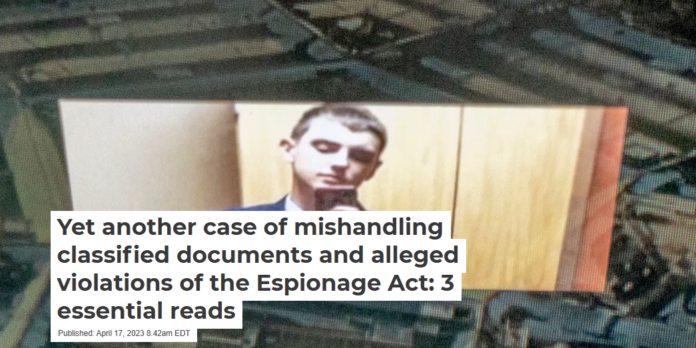

Howard Manly, The Conversation
The stunning arrest of 21-year-old Massachusetts Air National Guardsman Jack Teixeira on charges of illegally sharing U.S. intelligence has once again renewed questions on the handling of classified documents.
Since the discovery a decade ago of top-secret documents leaked by Edward Snowden, questions on the vulnerability of the nation’s most sensitive intelligence were only intensified after a variety of classified papers were found earlier this year in the possession of former U.S. President Donald Trump at his home at Mar-a-Lago in Florida.
Teixeira is accused of the “alleged unauthorized removal, retention and transmission of classified national defense information.” He has not entered a plea as yet to the charges involving the leaking of U.S. intelligence, including documents on Russian efforts in Ukraine and spying on U.S. allies.
The charges carry a maximum penalty of up to 15 years in prison.
Over the years, The Conversation U.S. has published numerous stories exploring the nature of classified documents – and how different motivations play a part in an individual’s decision to mishandle the nation’s secrets. Here are selections from those articles.
1. What are classified documents?
Before coming to academia, Jeffrey Fields worked for many years as an analyst at both the State Department and the Department of Defense.
In general, Fields writes, classified information is “the kind of material that the U.S. government or an agency deems sensitive enough to national security that access to it must be controlled and restricted.”
Of the three levels of classification, a “confidential” designation is the lowest and contains information whose release could damage U.S. national security, Fields explains.
The next level is “secret” and refers to information whose disclosure could cause “serious” damage to U.S. national security.
The most serious designation is “top secret” and means disclosure of the document could cause “exceptionally grave” damage to national security.
2. Violations of the Espionage Act
On April 14, 2023, U.S. prosecutors charged Teixeira in connection with violations of the Espionage Act.
Joseph Ferguson and Thomas A. Durkin are both attorneys who specialize in and teach national security law. They explain the Espionage Act.
Typically, violations of the act apply to the unauthorized gathering, possessing or transmitting of certain sensitive government information and fall under 18 U.S.C. section 793.
Ferguson and Durkin also urge patience before rendering judgment on any case involving violations of the Espionage Act, in part because of the classified nature of the potential evidence and the risk that further exposure would have on U.S. national security.
“The Espionage Act is serious and politically loaded business,” they write. “These cases are controversial and complicated in ways that counsel patience and caution before reaching conclusions.”
3. How to fight future leaking
Cassandra Burke Robertson is a scholar of legal ethics who has studied ethical decision-making in the political sphere.
She points out that criminal prosecutions alone may not be the only way to prevent the flow of classified information.
It all depends on an individual’s motivation.
But unlike Snowden, Reality Leigh Winner or Chelsea Manning, Teixeira does not appear to have wanted to right a perceived wrong or become what is known as a whistleblower.
In cases where the motive is unclear, Robertson suggests that a potential deterrent is establishing a workplace environment that encourages employees to bring potential ethical and legal violations to an internal authority for review.
Known as internal whistleblowing, such actions may prove effective in not only protecting classified information from reaching the public but also prevent another national security embarrassment.
Howard Manly, Race + Equity Editor, The Conversation
This article is republished from The Conversation under a Creative Commons license. Read the original article.



















